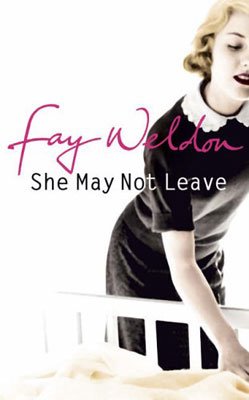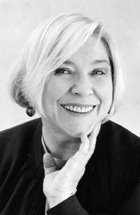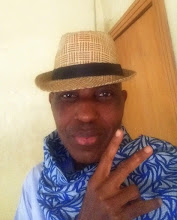 She May Not Leave, by Fay Weldon, published by Fourth Estate, $36.
She May Not Leave, by Fay Weldon, published by Fourth Estate, $36.From the book jacket:
Be careful who you invite into the bosom of your home - she may never leave... The new novel from Fay Weldon, the writer who knows women better than they know themselves. Hattie has a difficult loving partner, Martyn, an absentee mother, Lallie, and a cynical attentive grandmother Frances. She tries to do the right and moral thing in a tricky world, and always has. But she now has a baby, Kitty, which makes true morality rather harder to achieve. Somehow, money has to be earned. Into this household comes Agnieszka, from Poland, a domestic paragon. But is she friend or foe? And even if she is foe, and seems likely to bring the domestic world crashing down around their ears, can they afford to let her go? Well, no. Martyn works for a political magazine, Hattie for a literary agency. At work, too, integrity is suffering as the need for compromise becomes ever more pressing. And always in the background is Frances, tracing the family and social history: and not just family and society but the dwelling houses too; and all those girls and women (the au pairs, the child-minders, the cleaners) who've made Hattie what she is. Not to forget that hefty dollop of male genes which has also played its part - for Hattie's is a lively and none too respectable background - and now, finally, Agnieszka, come to claim her rightful heritage - which is, let's face it, everything. Will Hattie go to the wall? And poor little Kitty! Or will rescue come?
 *
*A Testament to the One True Fay
By KNIGHT, Kim
Source: Sunday Star-Times
MEN ARE irrelevant, says Fay Weldon. Unless you want to be happy.
"You can have children without them, you don't have to be married, you
can earn a living... but I think it's a fairly miserable life for
women without men."
Weldon is the 74-year-old feminist author with more than 25 novels,
one Booker prize - and three husbands.
"I get really cross with women when they denigrate men, when they make
terribly funny sweeping statements about men."
She pauses. "Which is how I make my living!"
In her latest book, She May Not Leave, Martyn the man is trumped into
pseudo- motherhood and Hattie the wife gets her life back. Classic
Weldon.
"I think there are sets of pre- occupations," she says of her stories.
"One is our extraordinary propensity to deceive ourselves about what
we're doing. Self-deception and denial and how we all look after our
own interests while pretending that we're not - or how morality fails
in the face of necessity."
Lessons in morality from the woman whose characters specialise in
revenge? Careful what you tell Weldon over lunch.
"I said something terrible to a woman recently," she says.
"Unfortunately they'd all been drinking and I hadn't. She said she was
really upset about the orphans in Kashmir and couldn't we do anything?
I said, `well, no you can't, but you could actually ring up social
services and offer to foster a child around the corner'."
People don't want to hear that, Weldon acknowledges. "Because it
suggests they might actually have to take some action ... your heart
bleeds and so does mine, but I don't say so because I know the answer
is to bring some children into my house who could very well do with a
little bit of warmth and civilisation. I'm not prepared to do it."
But she might pray for them. Weldon - whose early church experiences
include singing hymns at Christchurch Girls' High School (she was
brought up in New Zealand, but returned to the UK as a teenager) - has
rediscovered religion.
"I don't go on about church, unless asked, but if people went to
church, they would get a shape to their life. I think it's extremely
difficult for people to live without some sort of faith or confidence
or sense of a morality. It's almost impossible for people to live
within any moral framework which is not related to a religion."
How does this woman's libber see God?
"I don't. I don't have the tools to do it. I have five senses, and
they're not enough. One just knows there is more... I get intimations
of it sometimes, you get an aesthetic appreciation of things and
intellectual pleasure in things sometimes which is sort of more than
human."
Through the church, says Weldon, "the wisdom of the ages is available
to you. And, absolutely, a sense of collectiveness. A small cluster of
people looking rather fearfully at the heavens wondering what's going
to happen next. It sort of focuses the mind. And you look after your
neighbour."
Dear reader, don't despair. Weldon's latest offering might be strong
on morals, but it also features group sex and drugs. "Why should what
you write in your 70s be any different to what you write when you're
in your 30s, except that you know more when you're 70? You know what's
going to happen next, you have seen it happen and this is a great
advantage. That I like. I don't like the fact that when I sneeze, I
worry in case I slip a disc."
Weldon is sharp and funny, even though it's after 11pm in Dorset. It's
not too late for an interview, says her husband, Nick Fox. They're
just home from dinner, he says, and Fay's on antibiotics for her
tooth, so she's had nothing to drink. And then she's on the phone,
alternately engaged and detached, depending on the topic. "Always
controversial," suggest the critics. "I really am impervious to
labels," retorts the real thing. "So if they choose to think that,
then that's all right."
Truth is, there's little to say about Weldon that she hasn't said
about herself. Her autobiography (Auto da Fay, 2002) takes the reader
to 1963, and her fiction snatches portions of her life, before and
since. The latest is heavy with references to New Zealand.
"It sort of pops up," she says of the country she remembers in
fragments ("Of Amberley, I remember the hot wind blowing off the
mountains, day after day, and a bare flat landscape and a lot of sheep
there was no escaping").
"Is Cranmer Square still full of slugs and snails when it rains?" she
asks, when I tell her I'm sitting a stone's throw from her old high
school.
New Zealand shaped her memories - but not her character.
"I don't think I have a character at all that you could lay a finger
on! It's sort of the New Zealand desire to be useful... your time
needs to be spent making things better, doing something, getting
something to happen..
"It's kind of a nuisance really, this tendency. You'd obviously live a
much easier life if you didn't feel that you had to be useful. You
could just be decorative, or do nothing. Be a burden to others."








No comments:
Post a Comment